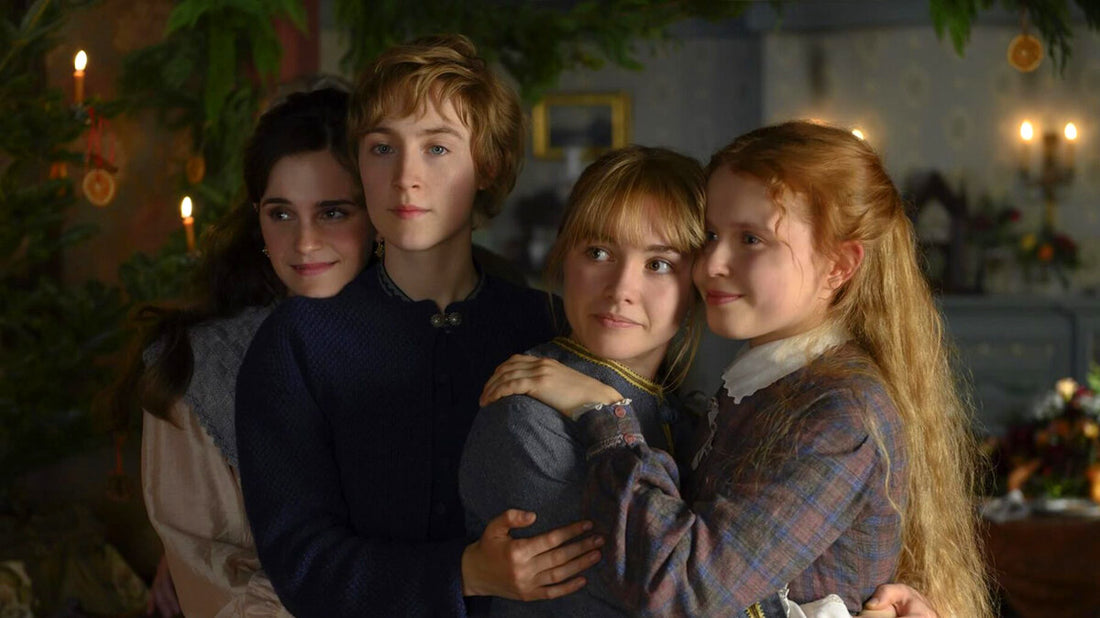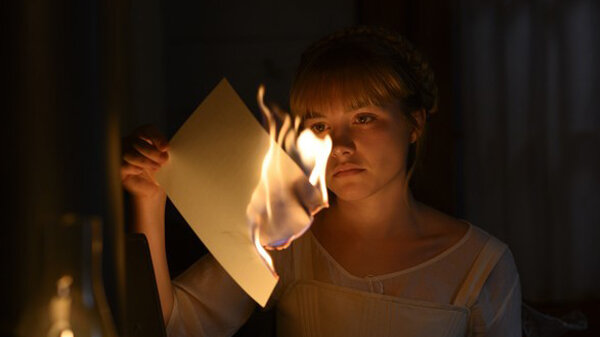In 1868, Louisa May Alcott wrote a story of four sisters growing up and finding their place in the world. Greta Gerwig’s screen adaptation of Little Women comes after over a dozen others – novels and films about young people coming of age are endless, but there’s something so urgently beloved about this specific world.
To pinpoint how Alcott’s words and Gerwig’s imagination have captured the minds and hearts of so many, four writers reckon with their own relationship with each March sister – whether it’s a case of seeing a mirror reflection, or finally finding answers about another woman it might have taken some time to understand.
From youngest to eldest, Amy, Beth, Jo and Meg March all live full and singular lives. It’s important to celebrate every single one.
Amy
Millicent Thomas
I used to hate Amy March. I thought the youngest of the four sisters was spoiled, selfish and oblivious to the consequences of her actions. Now, after growing up a little and watching Greta Gerwig’s sublime adaptation, I realise that Amy is all of those things – and so was I. Going from stroppy younger sister to a poised young artist, Gerwig and Florence Pugh have achieved the seemingly impossible, and turned Amy March into a sympathetic figure.
Watching the ‘then’ and ‘now’ of Gerwig’s two timelines in the film reveals Amy as not so different from Jo. Jo was always the sister to aspire to, an ambitious writer who dismissed trivial ‘girly’ things – something I wrongly found pride in doing as a teenager. But now I see so much light to be found in these things, that to be a woman means never limiting yourself. Amy and Jo mirror one another in many ways: both are stubborn, ambitious and prone to impulsive outbursts.
But is it possible to forgive Amy for burning Jo’s manuscript in her jealous rage? I certainly can’t, but I can say that I finally understand why she did it. Amy lives in Jo’s shadow, longing to prove her worth to everyone around her. Being left behind hurts, and whether it was by puncturing my brother’s football or hiding his Xbox controller, as a younger sibling, I too would be hurt when I wasn’t invited to join in.
My perception of Amy changed the most when she tells Laurie, “I want to be great, or nothing.” I was startled, as if a mirror had been held up and this unfamiliar character was suddenly staring back. I have Amy’s stubborn ambition – I don’t just want to be good at something, I want to be the best. Of course, that’s a damaging way to be; something Amy and I both know, but it doesn’t stop me. Pugh’s performance dug out complexities in Amy that I never thought existed.
I now see all the good in her, just as I’m learning to see in myself. She doesn’t give up, she adapts; she is not obnoxious, she’s headstrong; she doesn’t love half-heartedly, she does so fully and completely. Amy longs for comfort, security, education and love, and is perhaps the only sister who doesn’t reflect that, as a woman, she shouldn’t express her want for these things. Maybe it’s because she had three wonderful older sisters to learn from, or maybe she did it all on her own. Either way, I’ve found a new likability and similarity in Amy, and I love myself all the more for it.
Beth
Iana Murray
I’ve always been a quiet person. I’m a perpetual wallflower, and I fear public speaking and confrontation. I didn’t start speaking until I was three. It still takes some coaxing for me to really open up. Little Women wasn’t a part of my life until Greta Gerwig’s film came around, but I immediately fell for it. Partly because Gerwig makes the story her own by suffusing it with her singular modern sensibility, but also because Louisa May Alcott’s lively tale of sisterhood is timeless.
We all aspire to be like Jo to some extent. She’s the heroine; an outspoken ball of energy everyone orbits around. But I don’t see myself in Jo. The March sister I feel closer to is Beth. Mr Laurence asks if any of the girls would like to use his piano, and Beth speaks up before hiding behind Marmee, her cheeks reddening with both embarrassment and adrenaline. Through Eliza Scanlen’s performance, the film lovingly renders that momentary thrill of making your voice heard, and how anxiety ensures that such a thrill can only be enjoyed in small doses.
Beth doesn’t particularly like to share her talent with the world, preferring to keep her virtuosic gift for the piano to herself. I don’t blame her – after years of performing, I still find playing for others excruciating. I know all too well the enjoyment of solitary pursuits. When my time spent sitting on a piano stool lessened, I started writing.
For Beth, performing to no one but herself is the one selfish indulgence she allows in a life spent being selfless. She tends to the Hummel family when none of her sisters would, she crafts a pair of slippers for Mr Laurence not out of obligation, but pure generosity.
I find a kindred spirit in Beth March, but she’s also my hero: her kindness and virtuosity are traits I admire. Those may be humble characteristics compared to her sisters, but I believe Beth’s altruism is just as noble as Jo’s resourcefulness, Amy’s ambition or Meg’s maternal instincts. Beth may be quiet, but her values ring loud and clear.
Jo
Pamela Hutchinson
I feel like Jo several times a day, and often when I really shouldn’t. It seems like a very Jo March thing to do, to identify so strongly with the heroine of a novel – but then she is an odd kind of heroine. She’s no saint, and she’s not, we’re told, especially beautiful. Her opening lines in the book strike a note of childish, selfish complaint, undiplomatically spoken aloud. Before we know it, she’s lurking at a party in a ruined dress and forgetting her manners, having already mutilated her sister’s hair.
To add to her rap-sheet of crimes against 19th-century femininity, she’s clumsy and a terrible cook (salt instead of sugar on the strawberries). More painfully, she has a terrible temper and she hardly ever lives up to other people’s standards – or her own. Then again, she is clever and funny and passionate, all qualities that are worth more than any number of polite remarks or expensive dresses, unspoiled by scorch marks.
I loved Jo as girl because I too could be a great galumphing idiot, who spoke before she thought better of it, when I would rather have been elegant like Meg, sociable like Amy or serene like Beth. But also because I couldn’t think of a better way to spend an afternoon than on a sofa by a sunny window, turning the pages of a romantic book, fortified by a bag of russet apples and a good story. Perhaps it’s a bad sign that I, like Jo, found books more satisfactory than most people, and never felt alone in the company of a novel.
But I don’t think so – Jo was wise to show me that bad tempers can one day be tamed, and that the solitary pleasures of literature can keep a person warm when life gets difficult, and even pay the household bills. She also taught me that if a woman wants to make her voice heard, she may do it as well from her perch in a garret wearing a “scribbling suit” than by dressing up and maintaining one’s poise in smart society. When I’m feeling blue, I still turn to the pages of Little Women and its formative tales of girlhood, and amid the mist of nostalgia, I take comfort in watching the awkward progress of Jo and relearning the lessons she taught me.
Meg
Ella Kemp
As I write this, my sister has two and a half children. A five-year-old girl, and an almost-two-year-old boy. Her third child is due next Spring. As a stubborn and neurotic Taurus/Amy March, I selfishly hope it won’t arrive on the same day as my own birthday in May.
My sister would never think this way. She was 10 and a half when I was born, and my parents often remind me how patient and kind she was when I arrived. She’s a generous, loving sister and mother, perfectly suited to what she does. She never makes a fuss, or acts in a way that could deliberately upset anyone.
I don’t know if she has read Little Women. Over the past year leading up to the film, I’ve been reading and researching and acquainting myself with the March family as best I could. But this is my job, and everything I love. We’ve often differed like that.
At 18, my sister bought her own house, didn’t go to university in favour of keeping a job, and stayed in England while my family moved to France. At 34 now, she’s on house number 3, almost child number 3. Her home is beautiful and her husband is the sort of partner every parent wants their son or daughter to bring home.
My niece was born on the morning I went to university – the first thing I could tell my five new flatmates was that I was now Auntie Ella to someone. As my studies went on, I fell hard in love with the hectic experience of being a student, the life I’d created there and all the opportunities I now saw in my career and my relationships. But I’d never felt further away from my sister.
We were never extremely close – blame the years, or the Channel between us. But as I realised I wanted to study, to travel, to find and feel all the extremes I could, I noticed she didn’t. I was worried she wasn’t happy, that somehow she didn’t know she was depriving herself of an entire other life she could be living.
But I watched Emma Watson as Meg, I saw what my sister has. How she hasn’t deprived herself of anything. There is pain between the sisters in Little Women, particularly Meg and Jo (For what it’s worth, I’m more of an Amy). As they grow up and their desires diverge, there is disappointment from Jo that Meg is opting for a life of, as she sees it, giving and compromising.
But when I see all four, soon five, happy faces of my sister’s family this Christmas, I realise she’s building something so valuable – and she does it so much better than anyone else I know. My sister is like Meg. I don’t know if I’ll tell her I wrote this – but I’ll be keeping watch of her eyes as we go to see the new film together.
To keep up to date with our writers, you can follow Millicent (@MillicentOnFilm), Iana (@ianamurray), Pamela (@PamHutch) and Ella (@ella_kemp) on Twitter.
Our GRETA GERWIG t-shirt is available to purchase here. Proceeds go towards paying our writers and supporting female-led film projects.





